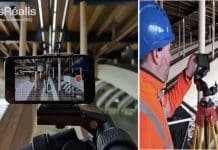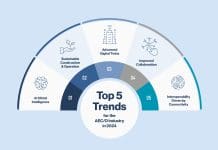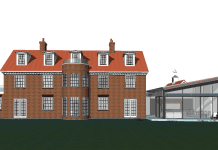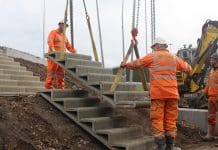Alexandra Bolton, executive director at the Centre for Digital Built Britain (CDBB), reflects on the first-ever CDBB Week and calls for collaboration on the road towards the National Digital Twin
There is no doubt that creating a digital built Britain presents both an exciting opportunity and a complex mission. In 2017, the Centre for Digital Built Britain (CDBB) was tasked by government to optimise the UK’s wealth of data, new technologies, tools and digital connectivity to transform the built environment and, importantly, deliver real social and economic benefits to its citizens. Such a mission requires a national and dynamic programme of change that works across sectors, disciplines and organisations to deliver meaningful and transformative outputs.
Our inaugural CDBB Week, which ran from 9 to 13 September, brought together the diverse components that combine to make the centre’s digital built Britain programme. It comprised a week of in-person and digital events showcasing our work, highlighting future opportunities and inviting feedback, engagement and collaboration essential to success.
It was a rich and varied menu of interactive, informative and inclusive events which saw the launch of the centre’s Digital Twin Hub (DT Hub), the release of CDBB’s animation What is the National Digital Twin?, a BIM Roundtable Garden Reception and a Research Showcase featuring an inspiring presentation by Paul Clarke, chief technology officer at Ocado.
Using digital twins to optimise complex systems
Looking at where digital and physical worlds collide, Paul spoke about the company’s innovative use of end-to-end simulations (or digital twins) to optimise complex systems and discover better ways of doing things without disruption to the day-to-day business – his blog based on this presentation is available to read on the CDBB website.
Our National Digital Twin Day, held in partnership with the Institution of Civil Engineers at their headquarters in London, opened CDBB Week and featured digital pioneers from government and industry delivering expert guidance, case study examples and practical insights on UK digital twins development.
Following the National Infrastructure Commission’s 2017 report Data for the Public Good, the government-appointed CDBB’s Digital Framework Task Group (DFTG) to facilitate the creation of the National Digital Twin (NDT).
Mark Enzer, CTO of Mott MacDonald, chair of CDBB’s DFTG and digital director of the Construction Innovation Hub (the Hub), described the NDT in his keynote as “a key part to fulfilling the vision of a digital built Britain”.
The industries appetite for digital twins
Recognising industry’s appetite to create digital twins to unlock value, NDT Day highlighted the potential benefits but urged industry to consider the importance of integration and adoption of the Gemini Principles – the values developed to guide the NDT. The Roadmap then provides a prioritised plan for the Information Management Framework that will enable the NDT – then an updated version will be published early next year.
Mark Enzer said: “We need to collaborate across the industry to deliver the National Digital Twin Programme. A key role of CDBB is to facilitate the alignment that’s required to enable secure resilient data sharing, which is at the heart of connecting digital twins.”
The benefits of a National Digital Twin
Industry is increasingly alive to the potential benefits of the NDT, cited by the National Infrastructure Commission as having the potential to unlock an additional £7bn per year of benefits across the UK infrastructure sector.
In addition to financial efficiencies, the NDT will bring benefits to society and the environment driving better outcomes for people per whole-life pound. In her keynote presentation, Sarah Hayes, project director for regulation at the National Infrastructure Commission, considered the predictive possibilities of the NDT and the benefits this will bring to planning infrastructure and helping to answer questions around housing, transport routes, energy and achieving net zero carbon.
Acknowledging progress made in the two years since the vision for a NDT was set out in Data for the Public Good, Hayes highlighted the strength of collaboration between CDBB, the Alan Turing Institute and the network of universities researching digital twins: “This kind of collaboration will accelerate our progress towards a NDT, which will give us a bird’s eye view across a city or town to plan, predict and improve our quality of life.”
National Digital Twin Day was a sell-out event and attracted an informed and engaged audience, many of whom attended a number of sponsor-led interactive digital twin workshops offering practical insights pitched at all levels – there are a number of interesting blogs from the SMEs who participated at the event published on the CDBB website.
NDT Day also marked the official launch of CDBB’s Digital Twin Hub (DT Hub) a collaborative web-based community – initially comprising representation from across the water, transport and power sectors – with the membership expected to grow. The DT Hub will support organisations on their digital twin journey.
Sam Chorlton, chair of DT Hub, said: “Only as the DT Hub grows can we demonstrate success. We will draw on the DT Hub network to push ahead and show what the capabilities of digital twin thinking and the National Digital Twin really are.”
CDBB Week
Each themed day of CDBB Week resulted in a range of content shared on our website and social media channels. Blogs published to mark International Day shine a light on the in-country experience of working with CDBB’s International programme. Written by representatives from government organisations in countries including Chile, Brazil, Colombia, Mexico and Peru, the blogs give a fascinating insight into the paths to digital and sustainable transformation and the shared benefits of collaboration and alignment.
The Research Showcase outputs include blogs and posters showcasing the rich and diverse research informing our programme, from information resilience in a digital built environment and evaluating automation in construction to methodologies for planning complex infrastructure under uncertainties and the use of digital technologies in housing for ‘generation rent’.
Our BIM Roundtables reception brought together industry professionals, policymakers and researchers with a shared interest in making Building Information Modelling (BIM) ‘business as usual’. The soon-to-be-published final report from the series of roundtables run over the last 12 months by CDBB and the Chartered Institute of Building, in partnership with Construction Manager, will analyse findings and identify next steps from the meetings, which spanned academia and training, constructors, consultants, manufacturers, SMEs, technology companies and specialist BIM consultants.
Keith Waller, programme director of the Construction Innovation Hub (a collaboration between the Manufacturing Technology Centre, Building Research Establishment and CDBB), spoke at the roundtables reception about the hub’s commitment to delivering the ambitions set out in the government’s construction sector deal.
Keith said: “In the UK, we spend around £65bn every year on economic and social infrastructure projects, building things like new schools and hospitals, roads and railways. The question for all of us is how can we do this in a way which delivers benefits for everyone while helping to decarbonise our economy and making our industry better, more attractive and more inclusive.”
Transformative Construction Challenge programme
A number of thought leadership blogs written by key figures from the Transformative Construction Challenge programme went live on the Hub’s website to mark Transforming Construction Challenge Day, creating an ongoing focal point to drive collaboration and feature success stories in the development, commercialisation and promotion of digital and manufacturing technologies for the construction sector.
CDBB Week was a fast-paced and informative set of activities giving ample opportunity for interaction and debate between delegates from industry, policy and academia helping to drive the conversation to progress digital transformation. Anyone who was not able to attend will find an abundance of blogs, summaries, posters and round-ups from all the events available to view on the CDBB website and social media channels, along with additional ways to continue to engage – we run an open programme and always welcome feedback and collaboration.
CDBB Week was the first of its kind. We both achieved and learned a lot – and will use lessons learned to present an even bigger and better series of events next year.
CDBB has also come a long way in two years but there is much to do. I hope people will continue to engage with our programme and join us on our shared journey towards a digital built Britain that serves the greater good and brings benefits to all.
Alexandra Bolton
Executive Director
Centre for Digital Built Britain
Twitter: @CambridgeCDBB
YouTube: Cambridge Centre for Digital Built Britain

















